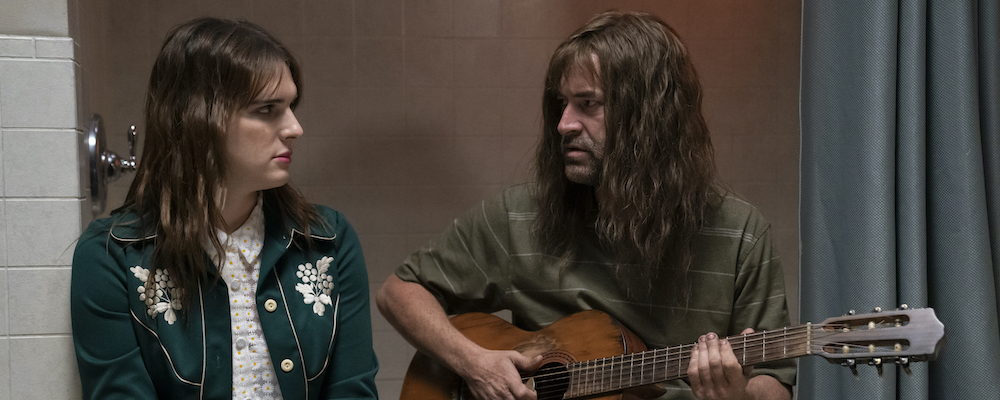The Duplass Brothers Close the Door on ‘Room 104’ With a Final Season Full of Wild Creativity
Alci Rengifo
is a shame that “Room 104” is saying goodbye. Now delivering its fourth and final season, this HBO oddity had become a dreamlike, endlessly alluring gem. By avoiding dragged out, connected storylines, it works best as a collage of hallucinatory, funny, at times hilarious, ideas. You can watch it in order, or out of sequence, it matters very little. But few, if any, times does the show ever repeat itself. To conclude their opus, the Duplass Brothers, Jay and Mark, go further, mixing more genres, splashing around different aesthetics like paint on a canvas.
More than any other season, this one showcases what made the Duplass Brothers’ vision so unique. Some of these episodes are somber, others nearly psychedelic, and more commonly this season, some celebrate the ‘80s and ‘90s. In the bizarre season opener, titled “The Murderer,” a group of friends have arranged to have a private performance in the room by Graham Husker (Mark Duplass). Husker is a long-lost musician, supposedly turned into a cult figure when Bono gave him a shout out at the Grammys. The friends, led by Logan (Logan Miller), promise not to record the performance. Looking like a refugee from the grunge era, Husker chugs a keg, proceeding to play songs that reveal a possibly murderous past. The episode veers from satire to semi-slasher thriller then ends on a surprisingly meditative note. Sometimes all you need is a hug.
From there the season gets stronger. One of the best episodes is “Avalanche,” starring Dave Bautista as Raw Dog, a pro-wrestler who appears to be underdoing some kind of therapy session. Combining real actors with action figures and mannequins, Raw Dog is tormented by hazy recollections. There is a hint he is haunted by a violent act, possibly involving an injury he caused to someone else. What begins as a commentary on the pro-wrestler image turns into a haunting, almost one-man play, about repressing painful memories. Bautista sitting alone in the room, fighting with his inner self, reveals a better actor than his goofier roles in films like “Guardians of the Galaxy.”
When the show prefers to avoid too much depth it basks in pure, darkly funny, genre fun. “Foam Party” opens with a title sequence that looks ripped from an old VHS tape. There is also a hilarious title sequence connecting the late ‘90s phenomenon of foam parties with the angst of a generation. Representatives of that generation then enter the room as a pack of friends, seemingly bored. They turn on a foam machine underneath a bed. Soon, however, the foam begins to reveal a dangerous characteristic. It starts eating their hair then proceeds to do other, shocking assaults. The underlying theme of this episode, wonderfully directed by actor Natalie Morales, never becomes quite clear. But it doesn’t matter. As a teen horror short it is a great entertainment. Morales’s best shot is of a victim staring in horror as a figure rushes through the foam, as if in homage to “Jaws.”
If “Foam Party” is a rowdy mini-scary movie, other episodes return to being moving in a surreal way. “Star Time” features Jillian Bell as a drug addict alone in the room, a needle always near a vein, seeming to hallucinate there is an alter ego joining her, dressed as a giant hamster. David Lynch would be proud of this episode. It uses its oddball imagery to convey the tragedy of losing your very senses to addiction. Flashbacks trace how Bell’s character came to this point, but with a strong subtlety. In elementary school her younger self brings cough syrup for show and tell, and we sense this is where it all begins.
Knowing this is the last lap for this show, the Duplass Brothers seem intent on trying out every conceivable style there is. “The Last Man” opens thousands of years ago, as two singing warriors go to battle before traveling back in time to the room. Shot in a wider, cinematic lens, the episode starts off as what could be mistaken to be a musical tribute to “Highlander.” Just as we’re going along with its manic energy, the narrative transforms into a powerful little statement on friendship. “Fur” is another episode that in 20 minutes dares more than entire seasons, using animation to tell a very wild story of two friends standing together against a potential rapist.
“Room 104” ends as it should. Genre, traditional story structure, stereotypes, these are all either tossed out the window or reinvented with anarchic glee. In addition to Bautista there are also other great guest performances from actors like Ntare Guma Mbaho Mwine in the inventive finale, “Generations,” which explores the very appeal of hotel rooms, Melissa Fumero in the strange, memorable “Bangs,” and Lily Gladstone in “The Night Baby Died,” a parable on video games.
When it first premiered in 2017, it was easy to tag “Room 104” as another attempt to emulate the success of Netflix’s “Black Mirror,” which has set a standard for dark TV anthologies. But this final season proves the Duplass Brothers are true originals. If HBO hoped to chase “Black Mirror” with this series, others that follow may very well look to it for inspiration. In this Peak TV era, where television has often been compared to the novel, the Duplass Brothers proved the short story can be kept alive and well in the format. Yet they never lost their sense of visual allure, the power of music, and the everlasting power of a haunting dream.
“Room 104” season 4 premieres July 24 and airs Fridays at 11 p.m. ET on HBO.

